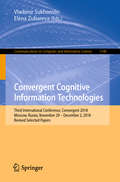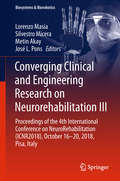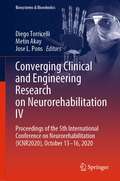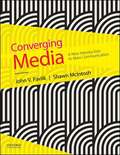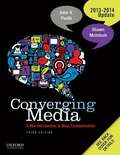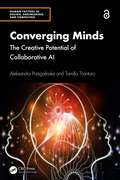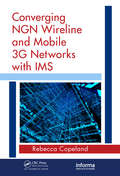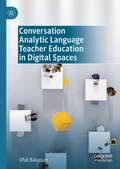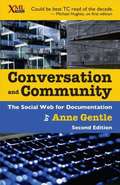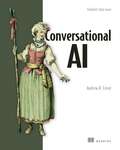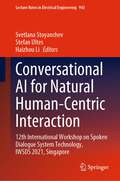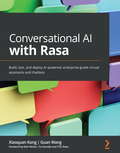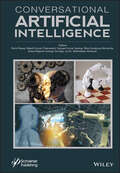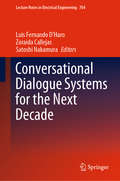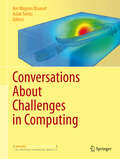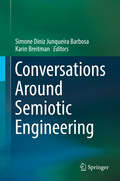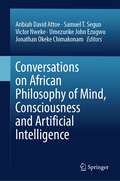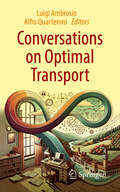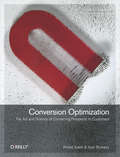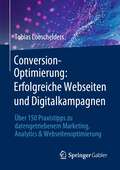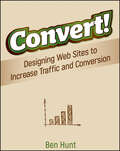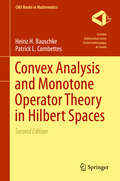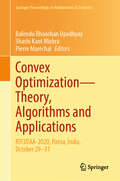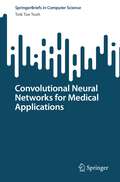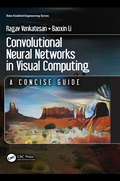- Table View
- List View
Convergent Cognitive Information Technologies: Third International Conference, Convergent 2018, Moscow, Russia, November 29 – December 2, 2018, Revised Selected Papers (Communications in Computer and Information Science #1140)
by Vladimir Sukhomlin Elena ZubarevaThis book constitutes the refereed proceedings of the Third International Conference on Convergent Cognitive Information Technologies, Convergent 2018, held in Moscow, Russia, in December 2018. The 26 revised full papers and 9 short papers were carefully reviewed and selected from 147 submissions. The papers of this volume are organized in topical sections on theoretical questions of computer science, computational mathematics, computer science and cognitive information technologies; cognitive information technologies in control systems; big data and applications; the Internet of Things (IoT): standards, communication and information technologies, network applications; smart cities: standards, cognitive-information technologies and their applications.- cognitive information technologies in the digital economics.- digital transformation of transport.
Converging Clinical and Engineering Research on Neurorehabilitation III: Proceedings of the 4th International Conference on NeuroRehabilitation (ICNR2018), October 16-20, 2018, Pisa, Italy (Biosystems & Biorobotics #21)
by Metin Akay José L. Pons Lorenzo Masia Silvestro MiceraThe book reports on advanced topics in the areas of neurorehabilitation research and practice. It focuses on new methods for interfacing the human nervous system with electronic and mechatronic systems to restore or compensate impaired neural functions. Importantly, the book merges different perspectives, such as the clinical, neurophysiological, and bioengineering ones, to promote, feed and encourage collaborations between clinicians, neuroscientists and engineers. Based on the 2018 International Conference on Neurorehabilitation (ICNR 2018) held on October 16-20, 2018, in Pisa, Italy,, this book covers various aspects of neurorehabilitation research and practice, including new insights into biomechanics, brain physiology, neuroplasticity, and brain damages and diseases, as well as innovative methods and technologies for studying and/or recovering brain function, from data mining to interface technologies and neuroprosthetics. In this way, it offers a concise, yet comprehensive reference guide to neurosurgeons, rehabilitation physicians, neurologists, and bioengineers. Moreover, by highlighting current challenges in understanding brain diseases as well as in the available technologies and their implementation, the book is also expected to foster new collaborations between the different groups, thus stimulating new ideas and research directions.
Converging Clinical and Engineering Research on Neurorehabilitation IV: Proceedings of the 5th International Conference on Neurorehabilitation (ICNR2020), October 13–16, 2020 (Biosystems & Biorobotics #28)
by Metin Akay Diego Torricelli Jose L. PonsThe book reports on advanced topics in the areas of neurorehabilitation research and practice. It focuses on new methods for interfacing the human nervous system with electronic and mechatronic systems to restore or compensate impaired neural functions. Importantly, the book merges different perspectives, such as the clinical, neurophysiological, and bioengineering ones, to promote, feed and encourage collaborations between clinicians, neuroscientists and engineers. Based on the 2020 International Conference on Neurorehabilitation (ICNR 2020) held online on October 13-16, 2020, this book covers various aspects of neurorehabilitation research and practice, including new insights into biomechanics, brain physiology, neuroplasticity, and brain damages and diseases, as well as innovative methods and technologies for studying and/or recovering brain function, from data mining to interface technologies and neuroprosthetics. In this way, it offers a concise, yet comprehensive reference guide to neurosurgeons, rehabilitation physicians, neurologists, and bioengineers. Moreover, by highlighting current challenges in understanding brain diseases as well as in the available technologies and their implementation, the book is also expected to foster new collaborations between the different groups, thus stimulating new ideas and research directions.
Converging Media
by John V. Pavlik Shawn McIntoshIndustry. Culture. Technology. It's time they came together. From reading news on tablets to video calling on smartphones, digital media has changed the ways in which we communicate. Placing convergence at the center of the discussion, Converging Media: A New Introduction to Mass Communication, Sixth Edition, uses the technologies we employ every day to explain our current media environment--and to consider where we might be headed.
Converging Media: A New Introduction to Mass Communication
by John V. Pavlik Shawn McintoshDigital media is changing the ways in which we communicate: we watch TV and movies online, call friends on computers, and read newspapers on cell phones. Placing convergence at the center of the discussion, Converging Media: A New Introduction to Mass Communication uses the technologies we employ everyday to explain our current media environment - and to project where we might be headed. Rather than discussing each media industry in isolation, Converging Media shows how each branch of media (print, visual, and audio) relates to and influences the others. This enables students to see the inextricable and dynamic relationship between converging media and traditional media formats.
Converging Minds: The Creative Potential of Collaborative AI (Human Factors in Design, Engineering, and Computing)
by Aleksandra Przegalinska Tamilla TriantoroThis groundbreaking book explores the power of collaborative AI in amplifying human creativity and expertise. Written by two seasoned experts in data analytics, AI, and machine learning, the book offers a comprehensive overview of the creative process behind AI-powered content generation. It takes the reader through a unique collaborative process between human authors and various AI-based topic experts, created, prompted, and fine-tuned by the authors.This book features a comprehensive list of prompts that readers can use to create their own ChatGPT-powered topic experts. By following these expertly crafted prompts, individuals and businesses alike can harness the power of AI, tailoring it to their specific needs and fostering a fruitful collaboration between humans and machines. With real-world use cases and deep insights into the foundations of generative AI, the book showcases how humans and machines can work together to achieve better business outcomes and tackle complex challenges. Social and ethical implications of collaborative AI are covered and how it may impact the future of work and employment. Through reading the book, readers will gain a deep understanding of the latest advancements in AI and how they can shape our world.Converging Minds: The Creative Potential of Collaborative AI is essential reading for anyone interested in the transformative potential of AI-powered content generation and human-AI collaboration. It will appeal to data scientists, machine learning architects, prompt engineers, general computer scientists, and engineers in the fields of generative AI and deep learning.Chapter 1 of this book is freely available as a downloadable Open Access PDF at http://www.taylorfrancis.com under a Creative Commons [Attribution- No Derivatives (CC-BY -ND)] 4.0 license.
Converging NGN Wireline and Mobile 3G Networks with IMS: Converging NGN and 3G Mobile
by Rebecca CopelandFocusing on the future network architecture and its main principles, Converging NGN Wireline and Mobile 3G Networks with IMS provides a comprehensive view of the methods, functions, network elements, and the interfaces among them that enable the building of a service agnostic and access agnostic session control layer based on the IMS standar
Conversation Analytic Language Teacher Education in Digital Spaces
by Ufuk BalamanThis book presents original research on language teacher education (LTE) activities in digital spaces, making use of a multimodal Conversation Analysis (CA) approach to examine multiple datasets and bring new insights into the theory, research, and practice of second/foreign language teacher education. The author conceptualizes a model of Conversation Analytic Language Teacher Education (CALTE), proposing a new knowledge base for LTE, identifying research-informed defining features, mapping the scope of an original praxis base, and providing research evidence from the implementation of this approach in and for digital spaces. The result is an argument for wide implementation and on-going improvement of the CALTE approach, and the book will be of interest to language teacher education professionals, multimodal CA researchers, and applied linguists.
Conversation and Community
by Anne GentleAnne Gentle's Conversation and Community has become the go-to reference for social media and technical communication. Her clear-eyed survey of the social media landscape has been adopted by many universities and is widely used by technical communicators. Now, in this second edition, she has updated and expanded her book, adding chapters on building a content strategy, analyzing web techniques, and developing an open source strategy. With more interviews and case studies, this is your guide to the new world of technical communication and social media. Inside the Book Towards the Future of Documentation Defining a Writer's Role with the Social Web Community and Documentation Commenting and Connecting with Users Wikis as Documentation Systems Finding Your Voice Content Strategy for Community Documentation NEW Chapter Analyzing and Measuring Web Techniques NEW Chapter Open Source Documentation NEW Chapter Concepts and Tools of the Social Web Glossary, Expanded Bibliography, and Index
Conversational AI
by Andrew FreedDesign, develop, and deploy human-like AI solutions that chat with your customers, solve their problems, and streamline your support services.In Conversational AI, you will learn how to: Pick the right AI assistant type and channel for your needs Write dialog with intentional tone and specificity Train your AI&’s classifier from the ground up Create question-and-direct-response AI assistants Design and optimize a process flow for web and voice Test your assistant&’s accuracy and plan out improvements Conversational AI: Chatbots that work teaches you to create the kind of AI-enabled assistants that are revolutionizing the customer service industry. You&’ll learn to build effective conversational AI that can automate common inquiries and easily address your customers' most common problems. This engaging and entertaining book delivers the essential technical and creative skills for designing successful AI solutions, from coding process flows and training machine learning, to improving your written dialog. Purchase of the print book includes a free eBook in PDF, Kindle, and ePub formats from Manning Publications. About the technology Create AI-driven chatbots and other intelligent agents that humans actually enjoy talking to! Adding intelligence to automated response systems saves time and money for you and your customers. Conversational AI systems excel at routine tasks such as answering common questions, classifying issues, and routing customers to the appropriate human staff. This book will show you how to build effective, production-ready AI assistants. About the book Conversational AI is a guide to creating AI-driven voice and text agents for customer support and other conversational tasks. This practical and entertaining book combines design theory with techniques for building and training AI systems. In it, you&’ll learn how to find training data, assess performance, and write dialog that sounds human. You&’ll go from building simple chatbots to designing the voice assistant for a complete call center. What's inside Pick the right AI for your needs Train your AI classifier Create question-and-direct-response assistants Design and optimize a process flow About the reader For software developers. Examples use Watson Assistant and Python. About the author Andrew R. Freed is a Master Inventor and Senior Technical Staff Member at IBM. He has worked in AI solutions since 2012. Table of Contents PART 1 FOUNDATIONS 1 Introduction to conversational AI 2 Building your first conversational AI PART 2 DESIGNING FOR SUCCESS 3 Designing effective processes 4 Designing effective dialogue 5 Building a successful AI assistant PART 3 TRAINING AND TESTING 6 Training your assistant 7 How accurate is your assistant? 8 Testing your dialogue flows PART 4 MAINTENANCE 9 Deployment and management 10 Improving your assistant PART 5 ADVANCED/OPTIONAL TOPICS 11 Building your own classifier 12 Additional training for voice assistants
Conversational AI for Natural Human-Centric Interaction: 12th International Workshop on Spoken Dialogue System Technology, IWSDS 2021, Singapore (Lecture Notes in Electrical Engineering #943)
by Stefan Ultes Haizhou Li Svetlana StoyanchevThis book includes peer-reviewed articles from the 12th International Workshop on Spoken Dialogue System Technology, IWSDS 2021, Singapore. Nowadays, dialogue systems or conversational agents have become one of the most important mechanisms for human-computer or human-robot interaction that has been widely adopted as new paradigm for many applications, companies, and final users. On the other hand, recent advances in natural language processing, understanding and generation, as well as a continuous increasing computational power and large number of resources and data, have brought important and consistent improvements to the capabilities of dialogue systems enabling users to have more productive and enjoyable interactions. However, on the threshold of a new decade, the current state of the art shows important areas where improvements are needed such as incorporation of ground-based knowledge, personality, emotions, and adaptability, as well as automatic mechanisms for objective, robust and fast evaluations, especially in the context of developing social and e-health applications. In this 12th edition of the International Workshop on Spoken Dialogue Systems (IWSDS), “Conversational AI for natural human-centric interaction“ compiles and presents a synopsis on current global research efforts to push forward the state of the art in dialogue technologies, including advances to the classical problems of dialogue management, language generation and understanding, personalisation and generation, spokena and multimodal interaction, dialogue evaluation, dialogue modelling and applications, as well as topics related to chatbots and conversational agent technologies.
Conversational AI with Rasa: Build, test, and deploy AI-powered, enterprise-grade virtual assistants and chatbots
by Xiaoquan Kong Guan Wang Alan NicholCreate next-level AI assistants and transform how customers communicate with businesses with the power of natural language understanding and dialogue management using RasaKey FeaturesUnderstand the architecture and put the underlying principles of the Rasa framework to practiceLearn how to quickly build different types of chatbots such as task-oriented, FAQ-like, and knowledge graph-based chatbotsExplore best practices for working with Rasa and its debugging and optimizing aspectsBook DescriptionThe Rasa framework enables developers to create industrial-strength chatbots using state-of-the-art natural language processing (NLP) and machine learning technologies quickly, all in open source.Conversational AI with Rasa starts by showing you how the two main components at the heart of Rasa work – Rasa NLU (natural language understanding) and Rasa Core. You'll then learn how to build, configure, train, and serve different types of chatbots from scratch by using the Rasa ecosystem. As you advance, you'll use form-based dialogue management, work with the response selector for chitchat and FAQ-like dialogs, make use of knowledge base actions to answer questions for dynamic queries, and much more. Furthermore, you'll understand how to customize the Rasa framework, use conversation-driven development patterns and tools to develop chatbots, explore what your bot can do, and easily fix any mistakes it makes by using interactive learning. Finally, you'll get to grips with deploying the Rasa system to a production environment with high performance and high scalability and cover best practices for building an efficient and robust chat system.By the end of this book, you'll be able to build and deploy your own chatbots using Rasa, addressing the common pain points encountered in the chatbot life cycle.What you will learnUse the response selector to handle chitchat and FAQsCreate custom actions using the Rasa SDKTrain Rasa to handle complex named entity recognitionBecome skilled at building custom components in the Rasa frameworkValidate and test dialogs end to end in RasaDevelop and refine a chatbot system by using conversation-driven deployment processingUse TensorBoard for tuning to find the best configuration optionsDebug and optimize dialogue systems based on RasaWho this book is forThis book is for NLP professionals as well as machine learning and deep learning practitioners who have knowledge of natural language processing and want to build chatbots with Rasa. Anyone with beginner-level knowledge of NLP and deep learning will be able to get the most out of the book.
Conversational Artificial Intelligence
by Romil Rawat Rajesh Kumar Chakrawarti Sanjaya Kumar Sarangi Piyush Vyas Mary Sowjanya Alamanda Kotagiri Srividya Krishnan Sakthidasan SankaranThis book reviews present state-of-the-art research related to the security of cloud computing including developments in conversational AI applications. It is particularly suited for those that bridge the academic world and industry, allowing readers to understand the security concerns in advanced security solutions for conversational AI in the cloud platform domain by reviewing present and evolving security solutions, their limitations, and future research directions. Conversational AI combines natural language processing (NLP) with traditional software like chatbots, voice assistants, or an interactive voice recognition system to help customers through either a spoken or typed interface. Conversational chatbots that respond to questions promptly and accurately to help customers are a fascinating development since they make the customer service industry somewhat self-sufficient. A well-automated chatbot can decimate staffing needs, but creating one is a time-consuming process. Voice recognition technologies are becoming more critical as AI assistants like Alexa become more popular. Chatbots in the corporate world have advanced technical connections with clients thanks to improvements in artificial intelligence. However, these chatbots’ increased access to sensitive information has raised serious security concerns. Threats are one-time events such as malware and DDOS (Distributed Denial of Service) assaults. Targeted strikes on companies are familiar and frequently lock workers out. User privacy violations are becoming more common, emphasizing the dangers of employing chatbots. Vulnerabilities are systemic problems that enable thieves to break in. Vulnerabilities allow threats to enter the system, hence they are inextricably linked. Malicious chatbots are widely used to spam and advertise in chat rooms by imitating human behavior and discussions, or to trick individuals into disclosing personal information like bank account details.
Conversational Dialogue Systems for the Next Decade (Lecture Notes in Electrical Engineering #704)
by Zoraida Callejas Satoshi Nakamura Luis Fernando D’HaroThis book compiles and presents a synopsis on current global research efforts to push forward the state of the art in dialogue technologies, including advances to the classical problems of dialogue management, language generation, question answering, human–robot interaction, chatbots design and evaluation, as well as topics related to the human nature of the conversational phenomena such as humour, social context, specific applications for e-health, understanding, and awareness
Conversations About Challenges in Computing
by Aslak Tveito Are Magnus BruasetThis text sheds light on how mathematical models and computing can help understanding and prediction of complicated physical processes; how communication networks should be designed and implemented to meet the increasingly challenging requirements from users; and how modern engineering principles can lead to better and more robust software systems. Through interviews with 12 internationally recognized researchers within these fields, conducted by the well-known science writer Dana Mackenzie and the science journalist Kathrine Aspaas, the reader gets views on recent achievements and future challenges.
Conversations Around Semiotic Engineering
by Simone Diniz Junqueira Barbosa Karin BreitmanDemonstrating the influence of Semiotic Engineering in Human-Computer Interaction, this book focuses on the work of one of the pioneers of the field - Clarisse de Souza - and her influence on this broad and wide-ranging area of research. It contains a selection of essays written by those that have worked with her over the years and will encourage readers to extend their reading and research in this area. Clarisse de Souza, widely known as the founder of Semiotic Engineering, will reach her 60th birthday in 2017, and the Semiotic Engineering Research Group that she founded will also celebrate its 20th anniversary. A key figure in HCI, Clarisse argued that human-computer interaction enables computer-mediated communication between the designer and the user at the point of interaction thus enabling and facilitating designers in understanding who their users are, and what their requirements may be. This book brings together prominent researchers who have helped to shape semiotic engineering by their insightful discussions on the theory.
Conversations on African Philosophy of Mind, Consciousness and Artificial Intelligence
by Samuel T. Segun Aribiah David Attoe Victor Nweke Umezurike John Ezugwu Jonathan Okeke ChimakonamThis book offers a first glimpse into contemporary African Philosophical thought, which covers issues related to the mind-body relationships, the problem of consciousness, the ethics of artificial intelligence, the meaning of life and other topics. Taking inspiration from the conversational tradition in African philosophy, this book not only engages with and takes inspiration from traditional African thought, but also engages with philosophical views outside the philosophical tradition in a bid to present a holistic understanding of the problems that are central to the book. The volume is relevant for professional African philosophers, philosophers of mind, philosophers of AI, undergraduate and postgraduate philosophy students, and African Studies scholars.
Conversations on Optimal Transport
by Luigi Ambrosio Alfio QuarteroniThis work is closely tied to the renowned mathematics textbook series known as UNITEXT, tailored for university students pursuing bachelor’s or master’s degrees. What sets this particular book apart in the Springer collection is its unique origin: it has been crafted through a meticulous process involving interviews handled with and by world-class mathematicians. The content featured in this book revolve around a highly relevant and engaging topic: Optimal Transport. These conversations involve not only authors from the UNITEXT series, but also members of the series’ Editorial Board. Additionally, they feature prominent figures in the field, including a Field Medalist. This work provides readers with a snapshot of remarkable vitality and freshness, guaranteed to captivate and engage anyone with an interest in mathematics. It’s important to note that these interviews were initially shared as podcasts and originally broadcasted as online events on the Cassyni platform. Subsequently, advanced AI tools were employed under human supervision to transcribe the audios and edit them for better readability. A human copy-editor was involved during the whole process, and the authors revised the final copy-edited texts before publication. The content in each format – the interviews, the PODCASTS and the book – is self-contained and not a mere adaptation from one medium to another. Instead, it represents an independent exploration of the subject matter.
Conversion Optimization: The Art and Science of Converting Prospects to Customers
by Khalid Saleh Ayat ShukairyHow do you turn website visitors into customers?Conversion Optimization offers practical advice on how to persuade visitors to make a buying decision -- without driving them away through data overload or tedious navigation. You'll learn how to use marketing principles, design, usability, and analytics on your site to increase your buyer-to-visitor ratio, whether you're involved with marketing or designing a large ecommerce site, or managing a modest online operation.Based on the authors' broad experience in helping businesses attract online customers, this book addresses every aspect of the process, from landing visitors to finalizing the sale. You'll learn several techniques for blending successful sales approaches with the particular needs of the people you want to attract. Are you ready to do what it takes to get a double-digit conversion rate?Explore case studies involving significant conversion rate improvementsWalk through different stages of a sale and understand the value of eachUnderstand your website visitors through persona creationConnect with potential customers and guide them toward a conversionLearn how to deal with FUDs -- customer fears, uncertainties, and doubtsExamine the path that visitors take from landing page to checkoutTest any change you make against your original design"The Web is unique in its ability to deliver this almost improbable win-win: You can increase revenue AND make your customers happy. Yet most websites stink. Worry not, Khalid and Ayat to the rescue! Buy this book to follow their practical advice on how to create high converting websites that your visitors love."--Avinash Kaushik, author of Web Analytics 2.0 and Web Analytics: An Hour A Day (both Sybex)
Conversion-Optimierung: Über 150 Praxistipps zu datengetriebenem Marketing, Analytics & Webseitenoptimierung
by Tobias LooscheldersDieses Buch ist ein praxiserprobter Guide, mit dem Sie Ihre Marketing-Kampagnen, Landingpages und Websites systematisch optimieren können. Zugleich ist es ein perfekter Leitfaden für den Einstieg in ein datengetriebenes Marketing. Es richtet sich an Berufseinsteiger im professionellen Online-Marketing und Marketers mit einigen Jahren Erfahrung, die nun den nächsten Schritt tun wollen.Über die Conversion-Optimierung werden Online-Kampagnen und Webseiten erfolgreicher gemacht – zudem lernt man viel über seine Kund:innen. Die Grundlage dafür sind Daten. Diese bilden das Fundament für effektive Maßnahmen wie A/B-Testing, Personalisierung und letztlich mehr Umsatz. Wer die dafür notwendigen Tools, Prozesse und KPIs beherrscht, erzielt bessere Ergebnisse und schafft entscheidende Wettbewerbsvorteile für das eigene Unternehmen.Das Buch ist gespickt mit handfesten Tipps für Marketers, die konsequent Ihr Online-Marketing mit einem datengetriebenen Ansatz nach vorne bringen wollen. Konkrete Modelle und Vorgehensweisen schaffen dafür Sicherheit und Durchblick. Tobias Looschelders erklärt u.a., wie die Optimierung von Webseiten mit dem 6-stufigen RETURN-Modell funktioniert, die Priorisierung von A/B-Tests mit dem SCORE-Framework verbessert wird oder Digital-Marketing-Maßnahmen optimiert werden können.Aus dem InhaltConversion Rates optimieren und mit effizienterem Marketing Geld sparenErfolgreiche Webseitenoptimierung: Best Practices mit dem RETURN-ModellA/B-Testing: mit Experimenten Webseiten systematisch optimierenErfolgreiche Optimierung und A/B-Testing von DigitalkampagnenIndividualisierte Webseiten und personalisiertes MarketingDie Geheimnisse funktionierender Conversion-OptimierungMit Gastbeiträgen von Philipp Mantel (case study air up GmbH) und Benjamin Uhlmann (case study Reishunger GmbH)Was Sie aus den einzelnen Kapitel mitnehmen werden:Aus Kapitel 1 „Conversion-Optimierung als Motor des Online-Erfolg“Was Conversions sind und weshalb die Conversion Rate ein so wichtiger Optimierungshebel ist.Wie sich die relevantesten Ansprüche und Bedürfnisse von Web-User:innen aktuell darstellen.Warum es so wichtig ist, über die verschiedenen Nutzergruppen Ihrer Webseite nachzudenken.Welche die wichtigsten Werkzeuge der Conversion-Optimierung sind.Wie Sie gute Optimierungsideen entwickeln.Einen konkreten 10-Schritte-Plan für die Implementierung datengetriebenen Marketings in Ihrem Unternehmen.Aus Kapitel 2 „Erfolgreiche Webseitenoptimierung“Die sechs wichtigsten Kategorien der Webseitenoptimierung.Worauf Sie achten sollten um Erstbesucher:innen Ihrer Webseite in den wichtigen ersten Sekunden für sich zu gewinnenMaßnahmen zur Steigerung der Interaktion mit Ihrer Webseite.Wie Sie die Benutzerfreundlichkeit von Webseiten erhöhen und Hürden für die Nutzer:innen abbauen.Wie Sie über Ihre Webseite klar und zielführend kommunizieren und erfolgreich argumentieren.Diverse Impulse, wie Sie Ihre Internetpräsenzen vertrauensschaffender gestalten können.Aus Kapitel 3 „A/B-Testing“Was Sie alles A/B-testen können, um den Erfolg Ihrer Webseite zu verbessern.Praktische Tipps zum A/B-Testing von Webseiten und welche Stolpersteine es zu vermeiden gilt.Warum es so wichtig ist, Testlaufzeiten einzuhalten (auch wenn es schwerfällt).Mit welchem kostenfreien Tool Sie ins A/B-Testing einsteigen können.Welche Kennzahlen Sie benötigen und warum dazu keine theoretische Statistik nötig ist.Wie Sie erfolgreich Test-Hypothesen formulieren.Konkretes Handwerkzeug, um Ihre Testideen faktenbasiert priorisieren zu können.Aus Kapitel 4 „Erfolgreiche Optimierung und A/B-Test
Convert!
by Ben HuntSolve your traffic troubles and turn browsers into buyersWhen web design expert Ben Hunt set out to quantify the difference between an ordinary web site and a great one, he expected to find the key in design simplicity. But when his team more than doubled the conversion rates for a wide range of sites, they identified simple yet powerful solutions involving design, copy, appropriate analysis, classic optimization techniques, and targeted testing. You'll find the fixes easy to implement, and they're all right here.Understand the essentials - your market, your proposition, and your delivery.Create a site that is seen by the right people, provides a compelling experience, and generates the desired action.Learn how to use testing to improve your site's conversion rate.Discover the holistic nature of web site optimization and why multiplicity matters.Examine dozens of simple techniques for building traffic, engaging your audience, and crafting effective calls to action.Combine creativity with analysis for the best possible results.Ben Hunt is Principal Consultant for Scratchmedia Ltd. He operates webdesignfromscratch.com, which provides tutorials and advice to over 120,000 web developers each month. Ben has been designing, coding, and producing web sites for clients worldwide for more than 15 years, and is considered a leader in the web usability industry.Forewords by Ken McCarthy, founder of the System Seminar, and Drayton Bird, Drayton Bird Associates.
Convex Analysis and Monotone Operator Theory in Hilbert Spaces (CMS Books in Mathematics)
by Heinz H. Bauschke Patrick L. CombettesThis reference text, now in its second edition, offers a modern unifying presentation of three basic areas of nonlinear analysis: convex analysis, monotone operator theory, and the fixed point theory of nonexpansive operators. Taking a unique comprehensive approach, the theory is developed from the ground up, with the rich connections and interactions between the areas as the central focus, and it is illustrated by a large number of examples. The Hilbert space setting of the material offers a wide range of applications while avoiding the technical difficulties of general Banach spaces. The authors have also drawn upon recent advances and modern tools to simplify the proofs of key results making the book more accessible to a broader range of scholars and users. Combining a strong emphasis on applications with exceptionally lucid writing and an abundance of exercises, this text is of great value to a large audience including pure and applied mathematicians as well as researchers in engineering, data science, machine learning, physics, decision sciences, economics, and inverse problems. The second edition of Convex Analysis and Monotone Operator Theory in Hilbert Spaces greatly expands on the first edition, containing over 140 pages of new material, over 270 new results, and more than 100 new exercises. It features a new chapter on proximity operators including two sections on proximity operators of matrix functions, in addition to several new sections distributed throughout the original chapters. Many existing results have been improved, and the list of references has been updated.Heinz H. Bauschke is a Full Professor of Mathematics at the Kelowna campus of the University of British Columbia, Canada.Patrick L. Combettes, IEEE Fellow, was on the faculty of the City University of New York and of Université Pierre et Marie Curie – Paris 6 before joining North Carolina State University as a Distinguished Professor of Mathematics in 2016.
Convex Optimization—Theory, Algorithms and Applications: RTCOTAA-2020, Patna, India, October 29–31 (Springer Proceedings in Mathematics & Statistics #476)
by Shashi Kant Mishra Balendu Bhooshan Upadhyay Pierre MaréchalThis volume includes chapters on topics presented at the conference on Recent Trends in Convex Optimization: Theory, Algorithms and Applications (RTCOTAA-2020), held at the Department of Mathematics, Indian Institute of Technology Patna, Bihar, India, from 29–31 October 2020. It discusses a comprehensive exploration of the realm of optimization, encompassing both the theoretical underpinnings and the multifaceted real-life implementations of the optimization theory. It meticulously features essential optimization concepts, such as convex analysis, generalized convexity, monotonicity, etc., elucidating their theoretical advancements and significance in the optimization sphere. Multiobjective optimization is a pivotal topic which addresses the inherent difficulties faced in conflicting objectives. The book delves into various theoretical concepts and covers some practical algorithmic approaches to solve multiobjective optimization, such as the line search and the enhanced non-monotone quasi-Newton algorithms. It also deliberates on several other significant topics in optimization, such as the perturbation approach for vector optimization, and solution methods for set-valued optimization. Nonsmooth optimization is extensively covered, with in-depth discussions on various well-known tools of nonsmooth analysis, such as convexificators, limiting subdifferentials, tangential subdifferentials, quasi-differentials, etc. Notable optimization algorithms, such as the interior point algorithm and Lemke’s algorithm, are dissected in detail, offering insights into their applicability and effectiveness. The book explores modern applications of optimization theory, for instance, optimized image encryption, resource allocation, target tracking problems, deep learning, entropy optimization, etc. Ranging from gradient-based optimization algorithms to metaheuristic approaches such as particle swarm optimization, the book navigates through the intersection of optimization theory and deep learning, thereby unravelling new research perspectives in artificial intelligence, machine learning and other fields of modern science. Designed primarily for graduate students and researchers across a variety of disciplines such as mathematics, operations research, electrical and electronics engineering, computer science, robotics, deep learning, image processing and artificial intelligence, this book serves as a comprehensive resource for someone interested in exploring the multifaceted domain of mathematical optimization and its myriad applications.
Convolutional Neural Networks for Medical Applications (SpringerBriefs in Computer Science)
by Teik Toe TeohConvolutional Neural Networks for Medical Applications consists of research investigated by the author, containing state-of-the-art knowledge, authored by Dr Teoh Teik Toe, in applying Convolutional Neural Networks (CNNs) to the medical imagery domain. This book will expose researchers to various applications and techniques applied with deep learning on medical images, as well as unique techniques to enhance the performance of these networks.Through the various chapters and topics covered, this book provides knowledge about the fundamentals of deep learning to a common reader while allowing a research scholar to identify some futuristic problem areas. The topics covered include brain tumor classification, pneumonia image classification, white blood cell classification, skin cancer classification and diabetic retinopathy detection. The first chapter will begin by introducing various topics used in training CNNs to help readers with common concepts covered across the book. Each chapter begins by providing information about the disease, its implications to the affected and how the use of CNNs can help to tackle issues faced in healthcare. Readers would be exposed to various performance enhancement techniques, which have been tried and tested successfully, such as specific data augmentations and image processing techniques utilized to improve the accuracy of the models.
Convolutional Neural Networks in Visual Computing: A Concise Guide (Data-Enabled Engineering)
by Ragav Venkatesan Baoxin LiThis book covers the fundamentals in designing and deploying techniques using deep architectures. It is intended to serve as a beginner's guide to engineers or students who want to have a quick start on learning and/or building deep learning systems. This book provides a good theoretical and practical understanding and a complete toolkit of basic information and knowledge required to understand and build convolutional neural networks (CNN) from scratch. The book focuses explicitly on convolutional neural networks, filtering out other material that co-occur in many deep learning books on CNN topics.
